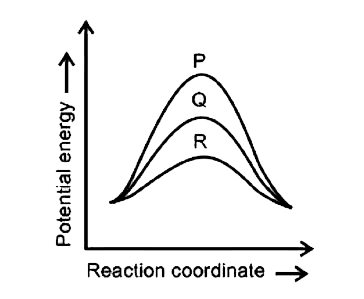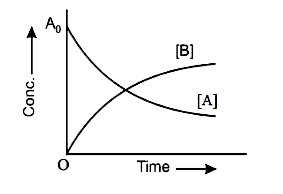Complete Solutions to MULTIPLE CHOICE QUESTIONS of chapter CHEMICAL KINETICS TEST -1 of Class 12 book with complete answers and questions
| Class 12 | CHEMISTRY |
| Chapter | CHEMICAL KINETICS TEST -1 |
| NTA MOCK TESTS | MULTIPLE CHOICE QUESTIONS |
| Number Of Questions | 30 |
| Academic Year | 2023-24 |
For a hypothetical reaction ` A to B` then activation energy for forward and backward reactions are 19 kJ/mol and 9 kJ /mol respectively. The heat of reaction is
View SolutionThe rate law for reaction between the substances A and B is given by Rate `= k [A] ^(n) [B] ^(m)`
On doubling the concentration of A and having the concentration of B, the ratio of the new rate of the earlier rate of reaction will be
View SolutionIf a homogeneous catalytic reaction can take place through three alternative paths as depicated below, the catalytic efficiency of P , Q, R representing the relative case would be,

View SolutionAt the point of intersection of the two curves shown, calculate the concentration of B in the first order reaction `A to nB.`

View SolutionBenzene diazonium chlride in aqueous solution decomposes as :
`C _(6) H _(5) - N = N ^(+) Cl _((aq)) ^(-) + H _(2) O _((aq))`
`to C _(6) H _(5) OH _((aq)) + N _(2 (g)) + HCl _((aq))`
The reaction follows first order kinetics. If p is the pressure of `N _(2)` at constant volume and temperture corresponding to time t and pf that after completion of the reaction , then which of the following graphs conforms to the kinetics of the reaction ?
View SolutionFor the reaction mechanism of the reaction.
`2 NO (g) + 2 H _(2) (g) to N _(2) (g) + 2 H _(2) O (g).`
`{:("Step l", 2 NO , overset(k _(1)) hArr, N _(2) O _(2):, K _(eq) ("fast")), ("Step ll", N _(2) O _(2) + H _(2), overset( k_(2)) to , N _(2) O + H _(2) O , ("slow")), ("Step lll", N _(2) O + H _(2), overset( K _(3)) to ,N _(2) + H _(2) O , ("fast")):}`
Expresson of rate of reaction is
(Take `k _(eq) xx k _(2) = k`)
View SolutionThe half-life of two samples of same compound is 0.1 s and 0.4 s. Their initial concentration is 200 M and 50 M respectively. What is the order of reaction ?
View Solution`2 N _(2) O _(5) hArr 4 NO _(2) + O _(2)`
For the reaction above, which of the following is not the correct rate of reaction ?
View SolutionRate of reacton depens upon
View SolutionFor the two gaseous reactions following data is given,
`A to B, k _(1) =10^(10) e ^(- 20, 000//T)`
`C to D , k _(2) = 10 ^(12) e ^(-24, 606//T)`
The temperature at which `k _(1)` becomes equal to `k _(2)` is ,
View SolutionThe rate law for the chemical reaction
`2 NO _(2) Cl to 2 NO _(2) + Cl _(2)`
Rate `= k [ NO _(2) Cl]` is The rate determining step is
View SolutionObserve the following reaction,
`2 A + B to C`
The rate of formation of C is ` 2.2 xx 10 ^(-3) mol L ^(-1) "mtextn"^(-1),` then rate of disappearance of A is
View SolutionFor a reaction `(1)/(2) A to 2B,` the rate of disappearance of 'A' is related to the rate of appearance of 'B' by the expression-
View Solution1 g of `""_(79) Au ^(198) (t _(1//2) = 65h)` give stable marcury by `beta-`emission. What amount of mercury will left after 260 h ?
View SolutionIf the instantaneous rate of appearance of `NO _(2) (g)` is `0.0400M//s` at same moment of time, what is the reate of disappearence of `N _(2) O _(5) (g) ` in M/s?
`[N _(2) O _(5) (g) to 2 NO _(2) (g) + (1)/(2) O _(2) (g) ].`
View SolutionFor the reaction ,
`2 NO (g) + 2 H _(2) (g) to N _(2) (g)`
` + 2 H _(2) O (g)`
The rate expression can be written in the following ways,
`(d [N _(2)])/( dt ) = k _(1) [ NO ] [H _(2) ] , (d [H _(2) O ])/(dt)= k _(2) [ NO ] [H_(2)]` The relationship between `k _(1), k_(2), k _(3), k _(4)` is ,
View SolutionThe reaction
`2 NO _(2) + F_(2) to 2 N _(2) F,` occurs in the following steps given below,
`NO _(2) + F _(2) overset("slow")to NO _(2) F + F`
`NO _(2) + F overset("fast")to NO _(2) F`
Thus rate expression of the above reaction can be written as,
View SolutionBy what factor does the rate of reaction increases when the temperature is increased from `30^(@)C` to `60^(@)C` ?
View SolutionFor reaction `A + 2 B to C + D` rate law `R = k [A] ^(1) [B] ^(2).` By what factor would the rate change if concentration of A is doubled & that of B is halved ?
View SolutionFor a gaseous reaction , following data is given:
`A to B, k _(1) = 10 ^(15) e ^( - 200 //T)`
`C to D, k _(2) = 10 ^(14)e ^( - 100 //T)`
The temperatuer at which `k _(1) = k _(2)` is :
View SolutionAt 500 K, the half life period of a gaseous reactio at an initia pressrue of 80 kPa is 350 s. When the pressure is 40 kPa, the half life period id 175 s, the order of the reaction is :
View SolutionFor the zero order reaction, ` A to B + C,` initial concentration of A is 0.1 M If [A] = 0.08 M after 10 minutes, then it's half life and completion time are respectively
View SolutionA catalyst is a substance which
View SolutionThe half-life period for catalytic decomposition of `AB _(3)` at 50 mm of Hg is found to be 4 hrs and at 100 mm of Hg it is 2 hrs. The order of the reaction is :
View Solution`99%` of a first order reaction was completed in 32 min. When will `99.9%` of the reaction complete ?
View SolutionThe rate constant (K') of one reaction is double the rate constant (K'') of another reaction. Then the relationship between the corresponding activation energies of the two reactions `(E _(a) ' and E _(a) '')` will be -
(Assume the pre-exponential factor & temperature to be same)
View SolutionWhich of the following curve represent zero order reaction of `A to` products ?
View SolutionWhen `log _(e)` k is plotted against `(1)/(T)` using the Arrhenius equation a straight line is expected with a slope equal to ,
View SolutionBy 10 K increase in temperature, the rate of reaction becomes double. How many times the rate of reaction will be if the temperature is increased from 303 K to 353 K ?
View SolutionConsider the following reaction in aquous solution.
`5 Br ^(-) (aq) + Br O _(3) ^(-) (aq) + 6 H ^(+) (aq)`
`to 3 Br _(1) (aq) + 3 H _(2) O (l)`
If the rate of appearance of `Br _(2)` at a particular time during the reaction is `0.025 "M sec" ^(-1),` what is the rate of disppearance (in `"Msec"^(-1)`) of `Br ^(-)` at that time ?
View Solution
MULTIPLE CHOICE QUESTIONS questions and complete solutions for chapter CHEMICAL KINETICS TEST -1 of NTA MOCK TESTS of Class 12